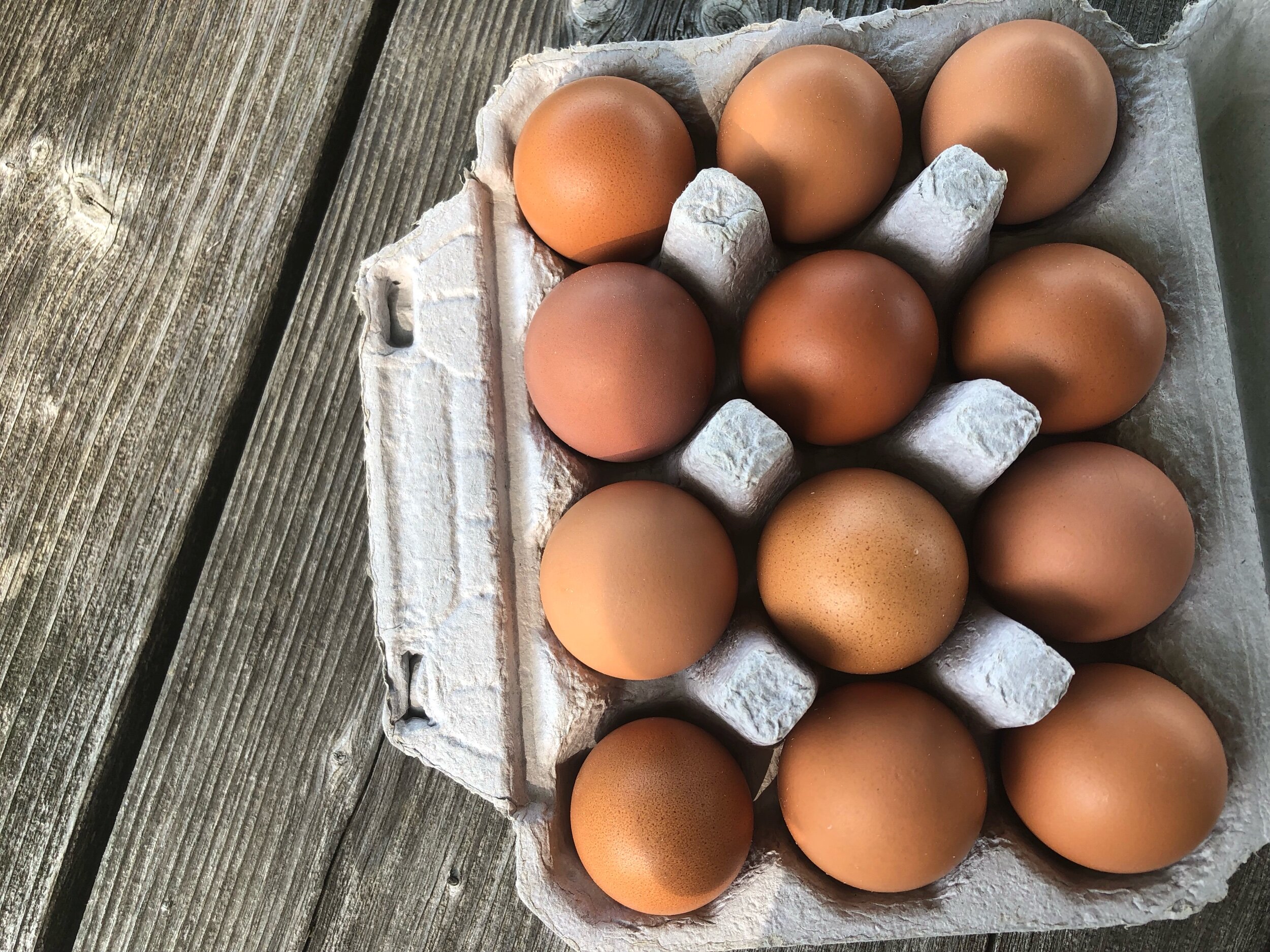Eggs are the most sought-after food from local farms. It’s no wonder… have you ever tried farm-fresh eggs? The difference in taste of a fresh egg compared to one that is store bought is hardly even comparable. They have brighter yolks and are richer in color, flavor, and texture. Once you eat farm-fresh eggs, you’ll never want to go back to the lack-luster store-bought ones.
The Incredible, Edible, NUTRITIONAL Egg:
Egg yolks are the richest source for two important carotenoids- lutein and zeaxanthin. These fat-soluble antioxidants combat macular degeneration, cataracts, support overall healthy vision, protect the skin against sun damage, and can reduce risk of colon and breast cancer.
One large, whole, fresh egg provides all essential protein-building amino acids, and offers 6 to 7 grams of protein. It also contains 5 grams of fat (with about 1.5 grams of it saturated), which is great for the absorption of all of the egg’s fat-soluble vitamins. One egg serves up about 200 milligrams of good cholesterol and contains vitamins A, K, E, D, B-complex and minerals iron, phosphorus, potassium, and calcium.
Eggs contain Choline, a fatty substance found in every living cell, and is a major component of brain health. Choline also helps preventing fat and cholesterol from sticking to arteries.
Eggs laid by chickens who have a pasture-based, free range lifestyle, contain more omega-3 fatty acids, folic acid, and vitamins E, A and B12 than eggs from chickens conventionally raised solely indoors.
Eggs from pasture-raised hens are packed with nutrients!
Double double-yolkers!
The Chickens of Maplebrook Farmstead:
All of our chickens are the same breed, Red Sex-Link, which are a hybrid cross between a Rhode Island Red rooster and a White Leghorn hen. They are called sex-links because their gender is easily determined at birth by their coloring. Males are born with white fluff while females are red.
We love the Red Sex-Links because they have very friendly temperaments and are phenomenal layers. They lay beautiful brown eggs year round (about 1 egg per chicken per day!), even keeping up in the wintertime without artificial lighting in the coop.
It is typically said that farm-fresh eggs from pastured poultry will have a deep orange-y yolk, however this can also be breed dependent. Despite the fact that our chickens get rotated on green pastures weekly, the Red Sex-Links tend to lay eggs with a vibrant yellow yolk.
We buy all of our chickens as ready-to-lay pullets, when they’re about 17 weeks old. After doing this for the past three years, I will never go back to raising chickens from day-old chicks ever again. Our pullets come from Moyer’s Hatchery in Pennsylvania, who do a phenomenal job raising them up to teenage-hood. When we get them, they’re only about two weeks away from starting to lay, which is a much more economical and time-efficient process for us.
Contrary to popular belief, there does not need to be a rooster in a flock in order for the hens to lay eggs. If there is no rooster in a flock, it just means that the eggs will never be fertilized, and thus never turn into chicks. We don’t have any roosters here, and we like it that way!
Chickens will usually lay their eggs in the early morning. I collect eggs twice a day- once around 8 or 9am, and once again in the early afternoon.
Handling and Storage Tips:
Eggs have a natural film coating the shell called the “bloom” that preserves bacteria from penetrating into it. When eggs are washed, it removes this film. That is why it is best to refrigerate eggs that have been cleaned. If you don’t wash eggs, they can be stored at room temperature for weeks.
At our farm, I wash only the dirty eggs (using just lukewarm water). Because I don’t differentiate between eggs that have been washed and those that haven’t, I refrigerate all of our eggs once they’ve been packaged. Once eggs have been refrigerated, they need to continue to be stored that way.
Eggs should always be stored “upside-down,” with the pointy end of the egg on the bottom. The round, fat end should be at the top. This is because there is an air bubble at the round end and keeping it at the top will keep the egg fresh longer.
How to tell if an egg is still good: the float test! Fill a glass or small container with water. Put the egg in the water. If it sinks, especially on its side, it’s fresh! If it floats, it’s rotten and should not be eaten! If it’s somewhere in between, use caution.
Eggs will typically stay good for at least two months. On our cartons, we have a “sell-by” date that is marked for one month after the eggs have been laid. They are easily good for a month after that sell-by date, usually even longer.
Every now and again, a chicken will lay a shell-less egg. It lacks a hard outer shell, but still contains the inner soft shell, making it squishy. A very rare and cool find!
Egg Carton Returns:
I get asked all the time if we take our egg cartons back to reuse them, and the answer is yes!! Cartons cost about 13 cents each, which adds up when we’re getting 20 dozen eggs per day from our chickens!
We are happy to reuse CLEAN, NON-RIPPED cartons. There is a return box located in the farm stand under the money box.
We can only reuse our own cartons, the ones that have 3x4 cells and our labels on them. We can’t use store-bought cartons or ones with other farm labels.
THANK YOU! We appreciate the extra effort of setting your cartons aside to save for us!






